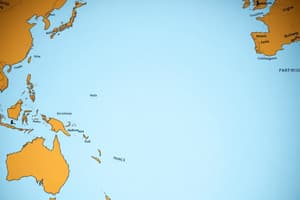Podcast
Questions and Answers
What is the main motivation behind imperialism?
What is the main motivation behind imperialism?
- Military conquest and domination
- Economic interests, political ambitions, and cultural assumptions of superiority (correct)
- Promotion of democratic ideals and freedom
- Religious beliefs and missionary work
How did European powers seek to fuel industrialization through imperialism?
How did European powers seek to fuel industrialization through imperialism?
- By advocating for international cooperation and diplomacy
- By acquiring colonies and territories to secure resources and markets (correct)
- By establishing trade partnerships with non-European nations
- By promoting self-sufficiency within their own territories
What were the methods used in imperialism?
What were the methods used in imperialism?
- Military conquest, economic and political coercion (correct)
- Peaceful negotiation and mutual agreements
- Promotion of cultural exchange and diversity
- Humanitarian aid and development assistance
How did imperialism impact the colonizers and the colonized?
How did imperialism impact the colonizers and the colonized?
How does imperialism continue to influence global dynamics?
How does imperialism continue to influence global dynamics?
What is the primary function of rhizomes in plant biology?
What is the primary function of rhizomes in plant biology?
In what way has the concept of 'rhizome' been metaphorically extended beyond botany?
In what way has the concept of 'rhizome' been metaphorically extended beyond botany?
Which pair of thinkers are specifically mentioned for extending the metaphor of rhizome to fields like philosophy and cultural studies?
Which pair of thinkers are specifically mentioned for extending the metaphor of rhizome to fields like philosophy and cultural studies?
What is the key implication of the rhizomatic metaphor on networks and systems?
What is the key implication of the rhizomatic metaphor on networks and systems?
Which type of plants benefit most from the unique structure of rhizomes?
Which type of plants benefit most from the unique structure of rhizomes?
In the context of botany, what is the primary function of rhizomes?
In the context of botany, what is the primary function of rhizomes?
What role does the rhizomatic metaphor play in fields like philosophy and cultural studies?
What role does the rhizomatic metaphor play in fields like philosophy and cultural studies?
Which plant benefits the most from the unique structure of rhizomes?
Which plant benefits the most from the unique structure of rhizomes?
Who are the thinkers specifically mentioned for extending the metaphor of rhizome to fields like philosophy and cultural studies?
Who are the thinkers specifically mentioned for extending the metaphor of rhizome to fields like philosophy and cultural studies?
What term best describes the interconnected system of thought or culture signified by the rhizomatic metaphor?
What term best describes the interconnected system of thought or culture signified by the rhizomatic metaphor?
Flashcards are hidden until you start studying




